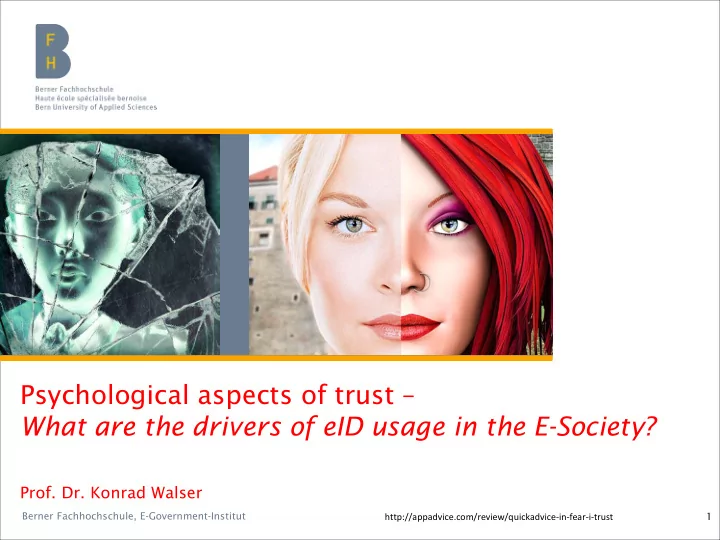

1 Psychological aspects of trust – What are the drivers of eID usage in the E-Society? Prof. Dr. Konrad Walser t Berner Fachhochschule | Haute école spécialisée bernoise | Bern University of Applied Sciences Berner Fachhochschule, E-Government-Institut 1 http://appadvice.com/review/quickadvice-in-fear-i-trust
What is trust from a psychological point of view? ▶ Situational aspects of trust generation => Risk of the subject ▶ Acting as a means of trust, taking into account benefits and vulnerability ▶ Hoping to have a positive outcome of acting (no bad thinking of the vis-a-vis) What about Snowden? I believe, that the I use E-Government What is my risk public administra- services because of of trusting the my positive thinking tion is positive public admini- about public admin. regarding my person stration behavior Berner Fachhochschule | Haute école spécialisée bernoise | Bern University of Applied Sciences 2
What shall I trust in? => BUT Institutional characteristics of public administration? Good will of institutions? E-Gov-Services? Electronic identity and the General lack of trust in mechanisms of it’s usage? public administrations Technical equipment? Source: eGov Monitor D21 2013 Virtual vis-a-vis? Berner Fachhochschule | Haute école spécialisée bernoise | Bern University of Applied Sciences 3
What is critical for trust in E-Government? ▶ Anchor point for economical prosperity ▶ Policy maker have to take into account, that the eID-ecosystem not only consists of technical solutions ▶ eID-Ecosystems have to adress domain oriented viewpoints and governance ▶ Enlarged view: Not only the subject is part of E-Government services Berner Fachhochschule | Haute école spécialisée bernoise | Bern University of Applied Sciences 4
What can be done from a research perspective? Research, research, and more research ▶ Enlarging research about «trust of individuals using eID’s» ▶ research the whole eID-ecosystem and the relationships of it’s stakeholders regarding to trust, not the subject only ▶ Evaluation of «cognitive dissonance» as a further research construct to be implemented in the research model Cognitive dissonance: “[…] excessive mental stress and ▶ discomfort experienced by an individual who holds two or more contradictory beliefs, ideas, or values at the same time […]” Influencing factors I really see the 5 I used the eID benefit using Cognitive several times my eID dissonance? I will use the eID Berner Fachhochschule | Haute école spécialisée bernoise | Bern University of Applied Sciences 5
Speaker’s CV – Prof. Konrad Walser PhD ▶ Full time Professor at University of Applied Sciences, Berne – E- Government-Institute since May 2012 ▶ PhD University of Bern – Information Science – CRM integration ▶ ITIL Expert, CGEIT, preparing CISA ▶ Teaching: IT Governance, IT Servicemanagement, Philosophy of Science ▶ Research: Behavioral science in information systems, IT Governance, E-Government, E-Business, IT management, IT service management ▶ Member of different ICT associations GI (German society of informatics) – ▶ Fachbereich 5 – WI – FG Strat. Info-Mgt. SwissICT – IT service management group ▶ GMDS (German society for medical information ▶ science, epidemology, biometrics) AIS – Association for Information Systems ▶ Member of ISACA (Switzerland chapter) ▶ konrad.walser@bfh.ch; +41 79 648 21 33 Berner Fachhochschule | Haute école spécialisée bernoise | Bern University of Applied Sciences 6
Different perspectives on trust from the STIAM ecosystem perspective Trust space / Domain Trust: Steering persp. Gov. Steering commitee governance Steering commitee management Trust: Steering persp. Mgt. Actually Authentication primary authority Relying party research focus Trust: Overall Subject perspective Attribute authority STIAM Broker Trust: Relying party perspective Trust: Trust: Subject Trust: Broker Authorities perspective perspective STIAM-Model perspective SuisseTrustIAM Berner Fachhochschule | Haute école spécialisée bernoise | Bern University of Applied Sciences Broker Federation 7
Different perspectives on trust from the STIAM ecosystem perspective ▶ Subject versus relying parties (actual discussion/research D21/trus- ting public administrations) ▶ Dependencies between measures of public administrations and trust of the subject ▶ Requiremenet: Policy makers have to develop trust through policy making and have to eliminate factors which destroy trust STIAM: SuisseTrustIAM – a federated identity project of Berne University of Applied Sciences Berner Fachhochschule | Haute école spécialisée bernoise | Bern University of Applied Sciences
Recommend
More recommend